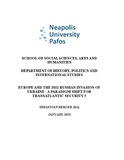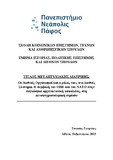Assess the Applicability of the Development – Security Nexus in The Complicated Political and Security Landscape of the Occupied Palestinian Territories – The Case of Security Sector Reform.
Thesis
The ongoing conflict between Palestinians and Israelis attracts international donors to devise further support to the Palestinians, responding to their humanitarian needs and security and economic advancements. Yet, instability and violence in the oPt underpins the international donor development interventions in the occupied Palestinian territories in which it relates to the main question of the research. The conditional policies of international donors further impede achieving security and sustainable development in the oPt. Furthermore, the conditional policies of international donors providing humanitarian, economic and security assistance has often capitalized on their strategic interests and serving the national interest of Israel without addressing the real needs of the Palestinians. This leads to a distorted and ineffective Palestinian political and security governance, resulting in posing a threat to both Palestinian and Israeli security alike, in which it further complicates efforts to achieve peace and stability in the region. Thus, the key question of the research is formulated around ‘assessing the applicability of security-development nexus in the complicated political and security landscape in the occupied Palestinian territories, particularly focusing on the security sector reform’. The research however utilizes a descriptive, qualitative approach counting on reviewing available existing literature and analysis of secondary data from academic and research articles, policy documents, and reports. The research further outlines the significance of the research topic that was not addressed before through crafting a theoretical framework that highlights the evolvement of the security-development nexus indicating the necessity to address both concepts without further jeopardizing the other. This concludes the fact that development requires environments boasting stability, and thus ensuring security require further developing the socio-economic status of a nation. The research comes to conclude that the international assistance interventions in the oPt are conditional and politicized, habitually responding to the geostrategic interests of donor countries. Consequently, the development and security interventions do not address the real needs of the Palestinians – leading to implementing ineffective development programs that lack bolstering real stability and development. Ultimately, the research argues that the security-development nexus in the complicated context of the oPt is troubled with several challenges, predominantly stemming from the enduring Israeli occupation of the Palestinian territories, internal fragmented political divisions, as well as the securitized nature of international assistance. The research also emphasizes the necessity to reassess the donor policies and intervention strategies to ensure alignment with real developmental needs of the Palestinians. Limitations imposed by the timing and current political and security circumstances underpins the recommendation for further empirical research utilizing the mixed approach in future research for the purpose of obtaining the perceptions of international donor community, Palestinian security forces, and the Palestinian public. This mixed methodology will give evident, authentic, and illustrative outcomes on the applicability of the nexus within the intricacies of the Palestinian context.



